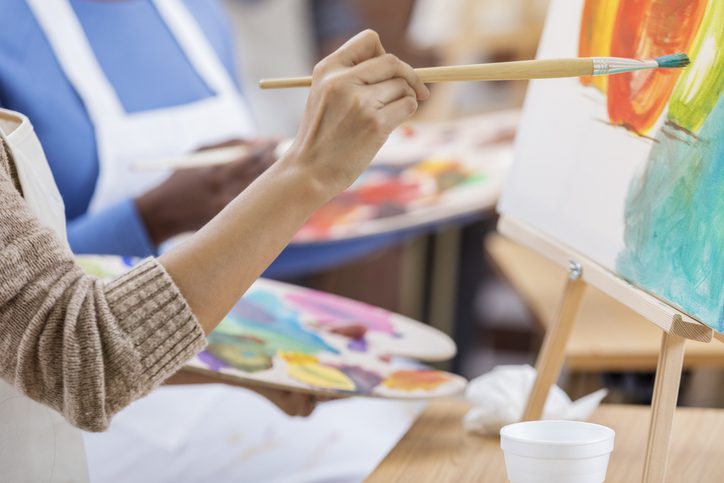Many people are initially resistant to engage in professional counseling because they consider it “navel-gazing,” or it isn’t in their nature to sit and talk about feelings, or certain circumstances are simply too challenging to address at a particular time. However, once someone’s immediate safety concerns are addressed in residential addiction and dual diagnosis treatment, there are numerous options for behavioral and emotional healing, including recreational therapy. Here’s why this might be a good option for you.
Benefits of Recreational Therapy
Also known as therapeutic recreation, this approach involves engaging you in various activities that promote physical, emotional, and social well-being. You’re not just sitting in a chair across from another person with a notebook.
- Some studies identify that a more kinetic or movement-based therapy method is reflective of how physical activity “improves the functioning of the hypothalamus-pituitary-adrenal axis,” which often prompts better sleep, reduced substance cravings, and an improvement in managing “various psychiatric disorders.”
- Other research suggests that when people are involved in certain group activities such as art or music therapy, this “has positive associations with behavioral coping self-efficacy and positive well-being postgroup, and high mental health self-efficacy…[which] elicit a process of empowerment that may improve recovery and well-being.”
The National Council for Therapeutic Recreation Certification indicates that “recreational therapists treat and help maintain the physical, mental, and emotional well-being of their clients by seeking to reduce depression, stress, and anxiety; recover basic motor functioning and reasoning abilities; build confidence; and socialize effectively.”
The American Therapeutic Recreation Association (ATRA) also notes that “research indicates that recreational therapy (RT) provides a variety of positive health outcomes for individuals of all ages” including but not limited to:
- Those with physical disabilities
- People with psychiatric disorders
- Individuals with developmental disabilities or brain injuries
- Older adults
- Youth at risk
ATRA adds that RT is often “an integral part of a patient’s treatment, providing active, outcome-focused care” that provides additional benefits, which we list verbatim:
- Addressing the whole person with a focus on enhancing independent functioning within physical, social, cognitive, and emotional domains.
- Training individuals to identify and utilize community resources that enable independent functioning.
- Focusing on skills that carry over to everyday life and can make a difference in a person’s quality of life.
- Providing a diversity of interventions that are cost-effective, add value, and have significant durability across an individual’s lifespan.
You’ll often find RT in settings such as inpatient and outpatient physical rehabilitation, inpatient and outpatient mental health, parks and recreation departments, skilled nursing facilities and assisted living, adult day programs, and acute care hospitals, to name a few.
Types of Recreational Therapy
The following RT methods are often tailored to individual preferences and needs, making them versatile tools in supporting recovery and improving overall mental health.
- Art therapy. Uses creative processes such as painting, drawing, and sculpting to help you express emotions, reduce stress, and improve mental health.
- Music therapy. Involves listening to, creating, or performing music to address emotional, cognitive, and social needs. This helps enhance mood, reduce anxiety, and enhance social interaction.
- Animal-assisted therapy. Incorporates interactions with animals, such as dogs, horses, or cats, to provide comfort, reduce stress, and improve social skills and emotional regulation. Equine-assisted therapy is just one of the many diverse recreational therapy options Great Oaks Recovery Center provides.
- Adventure therapy. People enjoy outdoor activities like hiking, rock climbing, and ropes courses to build confidence, teamwork, and resilience. Adventure-focused techniques encourage personal growth and coping skills.
- Dance/movement therapy. Uses movement and dance to promote physical and emotional well-being. It’s another way to express feelings, improve body awareness, and reduce stress.
- Drama therapy. Engages participants in role-playing, storytelling, and theater exercises to explore emotions, develop social skills, and process experiences.
- Yoga and meditation. Incorporates physical postures, breathing exercises, and meditation practices to reduce stress, improve physical health, and enhance your ability for emotional regulation.
- Sports and physical activity. Encourages participation in sports and fitness activities to improve physical health, boost mood, and foster social connections and teamwork.
- Gardening/horticultural therapy. Many people find that gardening activities—such as nurturing plants and connecting with nature—promote relaxation, reduce stress, and improve mood and self-esteem.
- Crafts and hobbies. Engages individuals in activities such as knitting, woodworking, or model building to provide a sense of accomplishment, reduce anxiety, and enhance concentration and creativity.
Discover Yourself at Great Oaks
Finding the right therapy for you is critical to your wellness success. At Great Oaks Recovery Center outside of Houston, Texas, our board-certified professionals not only address rehabilitation and relapse prevention, but also expose you to various therapies, techniques, and thought processes that reinforce your healthy choices. Recreational therapy is one of the many wellness programs you’ll discover on our tranquil 50-acre country estate. Call a member of our admissions staff today to learn why this approach might be the right fit for your goals.



